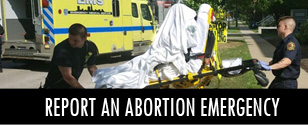We are posting below a story in its entirety that appeared in the June 10, 2008, edition of the Chicago Tribune. This article should encourage everyone in the pro-life movement. Our tactics are successful and our work is making an impact around the nation. The article shows a vibrant, effective pro-life movement that is changing with the times in order to bring the speediest end to abortion.
Here is a quote from the article from one of George Tiller’s attorneys:
Another of Tiller’s lawyers, Laura Shaneyfelt, said the threat to abortion rights in Kansas and elsewhere is very real, regardless of what happens with Roe. “People need to wake up and see this could have a real impact,” she said.
Attorneys don’t make these kinds of comments, indicating they could lose, unless they mean them. Please continue to pray for Operation Rescue and our work to save lives and stop abortion. If you are so led, your financial support is also very much appreciated. (Click to donate.)
-Operation Rescue Staff
__________________________
www.chicagotribune.com/news/nationworld/chi-roe_tuejun10,0,851108.story
Abortion foes take battle beyond Roe
Makeup of high court is political focal point, but activists cutting access with ruling intact
By James Oliphant, Tribune correspondent
June 10, 2008
WICHITA, Kan. — Troy Newman appears to be just about the happiest person who ever set foot in an abortion clinic.
“We’re winning,” Newman says excitedly. “We’re winning the youth. We’re winning the hearts and minds of the people.”
Except for his prematurely gray hair, Newman, the head of Operation Rescue, perhaps the most aggressive anti-abortion group in the nation, seems boyish and eager.
“I just want to be the best pro-lifer I can be,” he said.
The organization has just moved into its new offices in Wichita, a shuttered abortion clinic that Newman helped hassle out of business. “Nothing warms my heart more than a closed abortion clinic,” he said. He keeps souvenirs in his office of some of the clinics he has claimed credit for helping shut down.
Newman has good reason to feel optimistic. Through the work of groups like his, the number of places where women can obtain abortions in the United States has shrunk by two-thirds since the early 1990s, to about 700. The Guttmacher Institute, a reproductive-rights think tank that has had a longtime connection to Planned Parenthood, estimates abortions are now unavailable in 87 percent of counties nationwide.
It was in 1992 that the Supreme Court most famously reaffirmed a woman’s constitutional right to abortion, in Planned Parenthood vs. Casey. Newman said that case sent a signal to groups like his that they couldn’t wait for a solution on the federal level.
“All politics is local,” he said. “I asked myself, ‘What can I do?’ I can save this baby and close this abortion clinic.”
The national divide over abortion promises to resurface in the coming general presidential campaign. The presumptive Republican nominee, Sen. John McCain of Arizona, opposes abortion rights. Though he has never made that opposition a cornerstone of his congressional career, he has called for the overturning of Roe vs. Wade, the 1973 decision declaring that it was unconstitutional to ban abortion.
He also has turned up the attack on the federal judiciary in an attempt to woo skeptical conservatives. (Anti-abortion activists like Newman still express some discomfort with McCain, wondering whether he is truly committed to their cause.)
Sen. Barack Obama of Illinois, the presumptive Democratic presidential nominee, solidly supports abortion rights—so much so that the nation’s largest abortion-rights advocacy group, NARAL Pro-Choice America, endorsed him over Sen. Hillary Clinton last month in a move then considered highly controversial.
Few issues have galvanized voters more than abortion, and both parties have effectively used it as a fundraising mechanism. And in the heated rhetoric that’s sure to come in the campaign, the focus will lie where it has traditionally been, on the prospect that a shift in the balance of the Supreme Court could result in Roe being overturned.
2 openings possible
The next president may have the opportunity to fill one or two seats on the bench. Two of the court’s most liberal justices, John Paul Stevens, 88, and Ruth Bader Ginsburg, 75, are two of its oldest.
Court watchers believe there could be as many as four votes to overturn Roe, although only two justices— Antonin Scalia and Clarence Thomas—have actually said they would do so. The two newest justices, John Roberts and Samuel Alito, have yet to have an opportunity to weigh in on Roe, although both justices voted last year to uphold the federal ban on what critics call “partial birth” abortions.
While that decision was widely perceived as illustrating the court’s hostility toward abortion rights, it in fact pertained to an extremely small percentage of abortions nationwide, meaning the bulk of the court’s jurisprudence in the area remained intact.
But even if Roe is not invalidated in the near future, abortion opponents like Newman have plenty to feel good about. It isn’t just the unavailability of abortions nationwide, it’s the passage of laws banning late-term abortions and mandating waiting periods and parental notification, or those that allow so-called crisis pregnancy centers to sprout up that offer anti-abortion counseling.
And advocates in states such as Colorado and Georgia are pushing the envelope even further, attempting to enact “personhood” legislation that gives constitutional protection to the unborn.
Success on all of those fronts may mean that the future of Roe could be more of a political issue than a practical one. Overturning Roe doesn’t mean abortion would be outlawed, only that states would again have the power to forbid abortions within their borders. But by any measure, that has already occurred to some degree across the U.S.: Huge swaths of territory exist — mainly in the Southeast, Midwest and Northern Great Plains — where abortions are either unavailable or difficult to get.
The trends have abortion-rights advocates asking the question: If a constitutional right can no longer be exercised but by an elite minority of Americans, can it still be called a right?
“We are very, very worried that the right to choose will be a right in name only,” said Donna Crane, chief lobbyist for NARAL.
In 2007 the number of abortions in the U.S. hit its lowest point since 1974, the year after Roe became law. While that could speak to either a lack of access to abortion services or a philosophical shift in American society, abortion-rights activists also point to the increased availability of mifepristone, the “morning-after” pill and other emergency contraceptive drugs that take the place of a surgical procedure, meaning that abortions are increasingly taking place in the home and not in a clinic or a doctor’s office.
In addition, they say they have made progress on another front, ensuring that teenage girls and women have ready access to birth-control drugs to prevent unwanted pregnancies.
‘A fool’s issue’?
As a result, constitutional scholars such as Douglas Kmiec of Pepperdine University, a Justice Department official during the Reagan administration, said “the issue has lost some of its power, to be sure.”
Kmiec, who opposes abortion, said the Supreme Court’s refusal to hammer away at the foundation of the Roe opinion even as the court has grown more conservative convinced some anti-abortion activists that “this is a fool’s issue.”
So instead they turned their attention to the war on the ground, with less of an emphasis on standing in front of abortion clinics waving jars containing fetuses or holding mass demonstrations, and more on using state laws and local zoning regulations to try to drive clinics out of business. “You have to change with the times,” said Operation Rescue spokeswoman Cheryl Sullenger.
They coupled that with increased efforts to identify and harass doctors and staff members of clinics — whom they label “collaborators” — resulting in a precipitous decline in clinics nationwide.
Providers down sharply
Such abortion-rights advocates as the National Abortion Federation and Medical Students for Choice say those actions have contributed to a sharp decline in doctors who can perform abortions, some 37 percent since 1982. They also blame a lack of training in medical schools and a lack of social commitment among the younger members of the medical profession.
Another factor is the congressional prohibition on funding abortions for low-income women through Medicaid, a policy that has been in place since passage of the Hyde Amendment in 1976. A minority of states provide some reimbursement to abortion providers.
Added to that is a wave of consolidation in the hospital industry, especially involving mergers of religious hospitals with secular ones. MergerWatch, an abortion-rights group that tracks and opposes such mergers, said more than 100 such takeovers have occurred since 1990, with many resulting in a loss of abortion services when the religious hospital assumes control. That, too, largely affects low-income women who have to turn to hospitals or clinics for procedures.
“Your rights are dependent on your level of income,” NARAL’s Crane said. She said the anti-abortion efforts have operated successfully without triggering the alarm of many of those who support abortion rights and pushing them into action. “When the pro-lifers fight on the fringes, it doesn’t permeate in the same way that a total ban does,” she said.
Full-court press in Kansas
And then there are the more extreme methods for going after abortion providers, such as the drama taking place in Wichita.
Kansas is one of the few states that allow citizens to impanel their own grand juries. One has been investigating the activities of George Tiller, the Wichita physician who runs what probably is now the most famous clinic in the United States. Tiller, who was shot in both arms by a protester in 1993, is one of the few doctors nationwide who still perform late-term abortions. More than half of the abortions performed in Kansas have been for women who don’t live there, recent statistics released by the state show.
The citizen grand jury, which was convened after the local prosecutor declined to file felony charges against Tiller for violating state abortion regulations, has sought the records of some 2,000 patients of Tiller. Last month the state Supreme Court ruled that Tiller had to turn the records over, but with the patient names redacted.
Tiller’s lawyer, Lee Thompson, said the case demonstrates how the aggressive anti-abortion forces can effectively blunt the protections of Roe by driving out providers.
“A small minority of people through illegal conduct have created such a climate of fear and risk that it takes an exceptional person and incredibly brave and persistent person to overcome that,” said Thompson, a former Republican candidate for Congress in Kansas.
Another of Tiller’s lawyers, Laura Shaneyfelt, said the threat to abortion rights in Kansas and elsewhere is very real, regardless of what happens with Roe.
“People need to wake up and see this could have a real impact,” she said.
joliphant@tribune.com
Copyright © 2008, Chicago Tribune
















